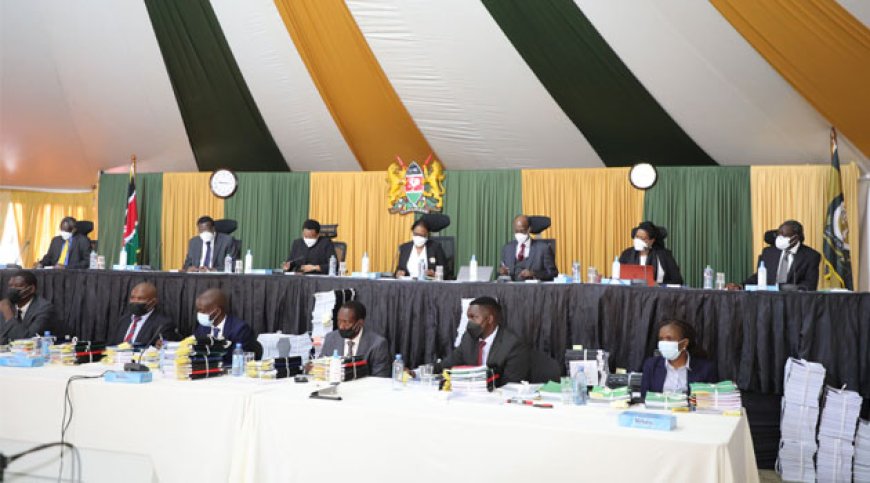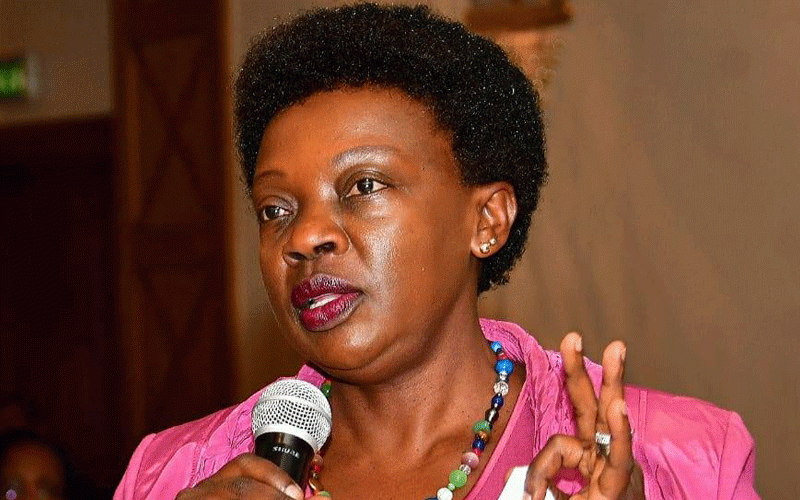By Joshua Cheloti
The Building Bridges Initiative (BBI) process was unconstitutional, the apex court has ruled.
In a ruling delivered by the Supreme Court on Thursday, the judges said the attempt to amend the constitution was against the law because it was initiated by President Uhuru Kenyatta.
Of the 7 judges at the court, six agreed that the President cannot initiate a constitutional amendment through the popular initiative.
[caption id="attachment_5213" align="alignnone" width="800"]

President Uhuru Kenyatta and ODM Leader Raila Odinga hold up the copies of the Buiding Bridges Initiative (BBI) at the Kisii State Lodge. |Photo| Courtesy|[/caption]
Only lady Justice Njoki Ndung’I had a dissenting verdict on the question of whether the president can initiate a popular initiative.
Other judges Chief Justice Martha Koome, Justice William Ouko, Justice Isaac Lenaola, Philomena Mwilu, Mohammed Ibrahim, Smokin Wanjala, and Smokin Wanjala however said the popular initiative is a reserve of the common mwananchi.
The Supreme Court judges however agreed that the Basic Structure Doctrine was not applicable in the country.
“The Basic Structure Doctrine is not applicable in Kenya. In order to amend the Constitution of Kenya 2010, the four sequential steps are not necessary,” said CJ Koome in part of the summary of the court’s ruling.
The Supreme Court ruling now marks the end of the famous BBI that had among others sought to introduce several political positions among them Prime Minister and two deputies.
BBI had also proposed an increase in the number of constituencies and allocation of at least 35 percent of the national budget to devolved units.

 President Uhuru Kenyatta and ODM Leader Raila Odinga hold up the copies of the Buiding Bridges Initiative (BBI) at the Kisii State Lodge. |Photo| Courtesy|[/caption]
Only lady Justice Njoki Ndung’I had a dissenting verdict on the question of whether the president can initiate a popular initiative.
Other judges Chief Justice Martha Koome, Justice William Ouko, Justice Isaac Lenaola, Philomena Mwilu, Mohammed Ibrahim, Smokin Wanjala, and Smokin Wanjala however said the popular initiative is a reserve of the common mwananchi.
The Supreme Court judges however agreed that the Basic Structure Doctrine was not applicable in the country.
“The Basic Structure Doctrine is not applicable in Kenya. In order to amend the Constitution of Kenya 2010, the four sequential steps are not necessary,” said CJ Koome in part of the summary of the court’s ruling.
The Supreme Court ruling now marks the end of the famous BBI that had among others sought to introduce several political positions among them Prime Minister and two deputies.
BBI had also proposed an increase in the number of constituencies and allocation of at least 35 percent of the national budget to devolved units.
President Uhuru Kenyatta and ODM Leader Raila Odinga hold up the copies of the Buiding Bridges Initiative (BBI) at the Kisii State Lodge. |Photo| Courtesy|[/caption]
Only lady Justice Njoki Ndung’I had a dissenting verdict on the question of whether the president can initiate a popular initiative.
Other judges Chief Justice Martha Koome, Justice William Ouko, Justice Isaac Lenaola, Philomena Mwilu, Mohammed Ibrahim, Smokin Wanjala, and Smokin Wanjala however said the popular initiative is a reserve of the common mwananchi.
The Supreme Court judges however agreed that the Basic Structure Doctrine was not applicable in the country.
“The Basic Structure Doctrine is not applicable in Kenya. In order to amend the Constitution of Kenya 2010, the four sequential steps are not necessary,” said CJ Koome in part of the summary of the court’s ruling.
The Supreme Court ruling now marks the end of the famous BBI that had among others sought to introduce several political positions among them Prime Minister and two deputies.
BBI had also proposed an increase in the number of constituencies and allocation of at least 35 percent of the national budget to devolved units. 


































































































































































































































































































